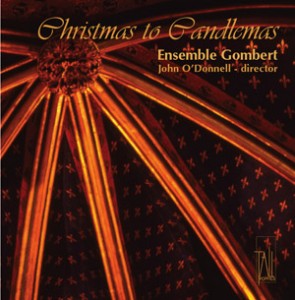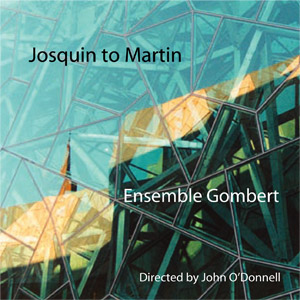
Released on Tall Poppies (TP121, 2000)
The title refers to the period between 25 December, the Feast of the Nativity of our Lord, commonly called Christmas (when the Church celebrates the Mass of Christ), and 2 February, the feast known as the Presentation of Christ in the Temple or, as it was commonly known in past centuries, Candlemas (The Mass of Candles), referring to the tradition of lighting candles during the singing of the Nunc dimittis before Mass.
The pieces are selections from the ‘Christmas to Candlemas’ concert programs that Ensemble Gombert has been performing annually since 1994. Often billed as “Melbourne’s carol-free Christmas concert”, ‘Christmas to Candlemas’ usually features an array of motets and a Mass setting chosen from the vast array of riches from the High and Late Renaissance.”
1. Jean Mouton – Nesciens mater virgo virum (a8)
2. Josquin Des Préz – Praeter rerum seriem (a6)
3. Andreas de Silva – Puer natus est nobis (a5)
4. Nicolas Gombert – Hodie nobis caelorum Rex (a5)
5. Jacobus Clemens non Papa – O magnum mysterium (a6)
6. Thomas Tallis – ‘Gloria’ from Missa Puer natus est nobis (a7)
7. Tomás Luis de Victoria – Quem vidistis, pastores (a6)
8. Jacobus Clemens non Papa – Vox in Rama (a4)
9. Orlando de Lassus – Omnes de Saba venient (a8)
10. John Sheppard – Reges Tharsis et insulae (a6)
11. Giovanni Pierluigi da Palestrina – Senex puerum portabat (a5)
12. Giovanni Pierluigi da Palestrina – Nunc dimittis (a12)
Singers
| Soprano |
Alto |
Tenor |
Bass |
| Deborah Summerbell |
Jennifer Mathers |
Peter Campbell |
Alexander Roose |
| Carol Veldhoven |
Belinda Wong |
Tim van Nooten |
Philip Nicholls |
| Fiona Seers |
Niki Ebacioni |
Vaughan McAlley |
Tom Reid |
| Maria Pisani |
Rebecca Woods |
Stuart Tennant |
Tim Daly |
| Claerwen Jones |
|
|
|
| Kathryn Pisani |
|
|
|
REVIEW
Noel Ancell, Music Forum, May 2007
While there may not be a word for it, there can be no doubt that there is a condition – particularly suffered by church musicians – of carol allergy. At this time of year we are regaled by countless performances – many of them atrocious – of those traditional hymns pertaining to the Christmas season. Ensemble Gombert has tried to alleviate the condition over many years by presenting ‘Melbourne’s carol-free Christmas concert’ regularly since 1994.
This CD is a compilation of some of the pieces from those concerts. If you are looking for anything like the usual seasonal offerings, forget it. This is a serious, even erudite, exploration of some of the music written for the forty days between December 25 and February 2, the feast of the Presentation of Christ in the Temple (otherwise known as Candlemas).
The repertoire comes almost exclusively from the 16th century. As one would expect, there are pieces by Palestrina, Victoria, Tallis, Lassus, and the eponymous Nicholas Gombert, but also gems from the lesser-known Jean Mouton, Andreas de Silva, Clemens (both father and non Papa), John Sheppard and Josquin. While there is a good deal of stylistic similarity, the differences one observes when hearing these composers side by side are fascinating.
The individual vocal characteristics of the singers add to the fascination: the voices are matched, but not blanded (sic), and this enriches the polyphonic textures, clearly differentiating the interweaving lines. The helpful, but not obscuring, acoustic of the Xavier College Chapel, one of the ensemble’s favourite haunts, delivers a range of colour that enhances the experience.
Director John O’Donnell has a wonderful ear for pitch and, apart from a few places at entries, his singers demonstrate habits of intonation that are quite exemplary. Particularly interesting – and well executed – are the characteristic pitch clashes of the works by Desprez and his ilk.
Rhythmically, I wished for more precision. This music abounds in rhythmical subtlety, even ambiguity. But the performances are less exciting than they could have been, especially at moments of transition between duple and triple metre. And what should surely be joyful ejaculations – Alleluia and Noe – are often plain dull.
This is not a CD for the newcomer to choral music, but it is an interesting and valuable addition to the available recordings of music from this period and a relaxing relief from the prevailing fare of Christmas carols.



